What is the difference between pumpkin seeds vs sunflower seeds? These tiny yet mighty morsels are delicious and healthy snacks packed with essential nutrients, providing numerous benefits worth exploring. Let's compare their differences and nutritional benefits.
Disclaimer: The information provided in this guide is for educational purposes only and should not be considered a substitute for professional medical advice. As always, consult with a qualified healthcare practitioner before making significant changes to your diet or lifestyle.
Jump to:
- What are Pumpkin Seeds?
- Anti-Parasitic Effects of Pumpkin Seeds
- Health Benefits of Pumpkin Seeds
- What are Sunflower Seeds?
- Ancient Medicinal Uses for Sunflower Seeds
- Health Benefits of Sunflower Seeds
- Nutritional Content Comparison
- Ways to Consume
- Getting the Best Seeds
- Other Nutritious Seeds
- Final Thoughts
- Comments
What are Pumpkin Seeds?
Pumpkin seeds, also known as pepitas, are edible seeds in pumpkins, a member of the Cucurbitaceae family. These flat, oval-shaped seeds are typically found encased in the fibrous flesh of the pumpkin's inner cavity. While pumpkin seeds have been enjoyed for centuries in various cuisines, their nutritional value has only recently gained widespread recognition.

Pumpkin seeds possess a rich history, with their usage dating back to ancient times.
They were highly valued by indigenous cultures, such as the Native Americans, who incorporated them into their diets and utilized their medicinal properties. Today, pumpkin seeds are renowned for their remarkable health benefits and are widely available as a versatile and nutritious snack.
Flavor and Texture
These seeds have a mild, earthy flavor that pairs well with both sweet and savory dishes.
They can be enjoyed in their raw, shelled form or roasted to enhance their taste and texture.
Pumpkin seed oil is also extracted from these seeds and is used as a culinary ingredient and a supplement due to its high nutrient content.
Nutrition
In terms of their nutritional composition, pumpkin seeds are a nutritional powerhouse. They are an excellent source of plant-based protein, providing a complete amino acid profile necessary for various bodily functions.
Additionally, pumpkin seeds are rich in healthy fats, particularly monounsaturated fats, and polyunsaturated fats, which contribute to heart health and provide sustained energy.
Pumpkin seeds are naturally low in carbs which makes them a perfect snack option for those following a low-carb or keto diet.
Pumpkin seeds are also abundant in vitamins and minerals, including vitamin B, magnesium, manganese, phosphorus, zinc, and iron.
These minerals play vital roles in supporting bone health, energy production, immune function, and overall well-being. Furthermore, pumpkin seeds contain notable amounts of antioxidants, such as vitamin E and carotenoids, which help protect the body from oxidative stress and promote cellular health.
 Lark Ellen Farm Sprouted Or...Shop on Amazon
Lark Ellen Farm Sprouted Or...Shop on Amazon
Anti-Parasitic Effects of Pumpkin Seeds
In addition to their culinary and nutritional significance, pumpkin seeds hold a remarkable historical significance for their traditional medicinal uses.
Native American cultures recognized the potent anti-parasitic properties of pumpkin seeds and utilized them as a natural remedy for expelling parasites from the body.
The Native Americans' knowledge and experience with pumpkin seeds' anti-parasitic effects were so profound that the United States Pharmacopeia officially listed pumpkin seeds as a recognized medicine for parasite elimination from 1863 to 1936.
This acknowledgment underscores the efficacy and historical importance of pumpkin seeds in traditional healing practices.
The anti-parasitic properties of pumpkin seeds are attributed to the presence of a compound called cucurbitacin.
This bioactive compound exhibits anthelmintic properties, meaning it can help eliminate various types of parasites from the digestive system.
Cucurbitacin in foods has been showing promising results in anti-cancer research as well! (Check out our anti-cancer diet and meal plan!)
While further research is needed to fully understand the mechanisms involved, the historical use of pumpkin seeds as a natural anthelmintic has laid the foundation for exploring their potential role in supporting gastrointestinal health.
The historical use of pumpkin seeds by Native Americans and their inclusion in the United States Pharmacopeia highlight the rich cultural heritage and the deep-rooted wisdom that indigenous cultures have bestowed upon us.
Health Benefits of Pumpkin Seeds
Pumpkin seeds offer a wide range of health benefits that make them a valuable addition to a balanced diet. Let's explore some of the key health benefits associated with pumpkin seeds:
Nutrient-Rich
Pumpkin seeds are packed with essential nutrients, including protein, healthy fats, fiber, vitamins, and minerals. With significant mineral contents, they are an excellent source of magnesium, manganese, phosphorus, zinc, and iron, which play crucial roles in supporting bone health, energy production, immune system function, and overall well-being.
Pumpkin seeds boast impressive levels of vitamins K, and E, and all of the B vitamins like pantothenic acid, riboflavin, thiamin, folate, and niacin. Pumpkin seeds are a good source of protein. They contain a diverse array of essential amino acids, the building blocks of proteins, which are crucial for various bodily functions and support overall health and well-being.
Heart Health
The high levels of magnesium found in pumpkin seeds are beneficial for heart health. Magnesium helps regulate blood pressure, supports proper heart rhythm, and contributes to overall cardiovascular function.
Additionally, the healthy fats in pumpkin seeds, such as omega-3 and omega-6 essential fatty acids, can help reduce LDL cholesterol levels and the risk of heart disease.
Anti-inflammatory
Pumpkin seeds possess anti-inflammatory properties attributed to their omega-3 fat content, which can help reduce levels of C-reactive protein, a marker of chronic inflammation, contributing to the overall management of inflammatory conditions.
Antioxidant Power
Pumpkin seeds are rich in antioxidants, including vitamin E and carotenoids. These compounds help neutralize harmful free radicals in the body, reducing the risk of chronic diseases and supporting cellular health.
Prostate Health
Pumpkin seeds have long been associated with promoting prostate health. They contain phytosterols, including beta-sitosterol, which may help reduce symptoms of an enlarged prostate and support urinary function. As a result, this helps to reduce the risk of certain prostate cancers.
Digestive Health
The dietary fiber content in pumpkin seeds promotes a healthy digestive system. Adequate fiber intake supports regular bowel movements, prevents constipation, and contributes to overall gut health.
Blood Sugar Control
The combination of fiber, protein, and healthy fats in pumpkin seeds helps regulate blood sugar levels. This nutritious seed is also low on the glycemic index which makes a great addition for diabetics. Including pumpkin seeds in meals can aid in stabilizing blood sugar and prevent spikes in glucose levels.
Sleep Support
Pumpkin seeds contain the amino acid tryptophan, which is involved in the production of serotonin and melatonin, neurotransmitters that regulate sleep and mood. Consuming pumpkin seeds may contribute to a good night's sleep and improved sleep quality.
Weight Management
The fiber and protein content of pumpkin seeds can help promote feelings of fullness, supporting healthy weight management by reducing excessive snacking and overeating. This is especially helpful for those on a weight loss journey.
Menopausal Support
Pumpkin seeds offer several benefits for postmenopausal women. They are rich in phytoestrogens, plant compounds that mimic the effects of estrogen in the body, potentially helping to alleviate menopausal symptoms such as hot flashes, night sweats, and mood swings.
Additionally, the high magnesium content in pumpkin seeds supports bone health and may help reduce the risk of osteoporosis, a common concern for post-menopausal women.
 Harvested For You Sea Salte...Shop on Amazon
Harvested For You Sea Salte...Shop on Amazon
What are Sunflower Seeds?
Sunflower seed kernels are edible seeds harvested from the vibrant sunflower plant, scientifically known as Helianthus annuus. These small, tear-shaped seeds are encased within the familiar black and white-striped shells.
While sunflower seeds are commonly associated with bird feeders and snack foods, they offer far more than just a crunchy treat.

Sunflower seeds have a rich history dating back to ancient times, with evidence of their cultivation by Native American tribes.
They were valued not only for their nutritional value but also for their versatility and medicinal properties.
Today, sunflower seeds have become a staple in various cuisines around the world and are recognized for their impressive health benefits.
Taste and Texture
Sunflower seeds possess a distinct nutty flavor with a subtle sweetness, making them a popular choice for snacking, baking, and cooking.
They can be enjoyed in raw form or roasted to enhance their taste and texture.
Sunflower seed oil is also extracted from these seeds and is widely used for culinary purposes due to its mild flavor.
Be aware that they are often highly processed, and cannot be fried at high temperatures or it may cause free radical formation.
Nutrition
In terms of their nutritional composition, sunflower seeds are packed with essential nutrients. They are an excellent source of protein, providing all the essential amino acids necessary for various bodily functions, including muscle growth and repair.
Sunflower seeds are also rich in heart-healthy fats, including monounsaturated and polyunsaturated fats, such as omega-6 fatty acids.
Furthermore, sunflower seeds are a great source of dietary fiber, which promotes digestive health, aids in maintaining regular bowel movements, and supports feelings of fullness.
These seeds are also rich in key vitamins and minerals, including vitamin E, vitamin B1 (thiamine), vitamin B6, folate, magnesium, selenium, and copper.
The vitamin E content in sunflower seeds, a potent antioxidant, helps protect cells from oxidative damage and supports skin health.
Additionally, sunflower seeds contain phytosterols, plant compounds that have been associated with reducing cholesterol levels and promoting cardiovascular health.
 Go Raw Organic Sprouted Sun...Shop on Amazon
Go Raw Organic Sprouted Sun...Shop on Amazon
Ancient Medicinal Uses for Sunflower Seeds
The Indigenous people of the Dakota, Cherokee, and Paiute Native American tribes incorporated sunflower seeds into their traditional medicinal practices to address specific health concerns:
Dakota (Sioux) Tribe: The Dakota people used sunflower seeds as a remedy for chest pains. They believed that consuming sunflower seeds or infusions made from the seeds could help alleviate discomfort and promote a healthier respiratory system. The expectorant properties of sunflower seeds were thought to ease congestion and assist in the expulsion of phlegm, providing relief for chest-related ailments.
Cherokee Tribe: Within Cherokee traditional medicine, sunflower seeds were used to support kidney health. The Cherokee people prepared remedies using sunflower seeds to address kidney troubles and promote urinary system well-being. They believed that sunflower seeds had diuretic properties, aiding in the elimination of excess fluids and toxins from the body, thereby supporting kidney function.
Paiute Tribe: The Paiute people utilized sunflower seeds as a natural remedy for alleviating rheumatism symptoms. They believed that the consumption of sunflower seeds or the application of poultices made from crushed seeds could help reduce inflammation and relieve joint pain associated with rheumatism. Sunflower seeds were valued for their ability to ease discomfort and improve mobility for those suffering from rheumatic conditions.
These specific uses of sunflower seeds within the Dakota, Cherokee, and Paiute tribes highlight the diverse range of medicinal applications attributed to this versatile plant. The traditional knowledge and practices of these indigenous cultures provide valuable insights into the historical uses of sunflower seeds for targeted health benefits.
Health Benefits of Sunflower Seeds
Sunflower seeds offer multiple potential health benefits, making them a nutritious addition to your diet. Let's take a closer look at the remarkable advantages these seeds provide:
Nutrient-Rich Powerhouse
Sunflower seeds are a nutritional powerhouse, packed with essential nutrients. They are an excellent source of protein, healthy fats, dietary fiber, vitamins (such as vitamin E and B vitamins), and minerals (including magnesium, selenium, and copper). Incorporating sunflower seeds into your meals can help you meet your daily nutrient requirements.
Heart Health Support
Sunflower seeds contain heart-healthy fats, including monounsaturated and polyunsaturated fats. These fats, particularly the omega-6 fatty acids, help lower LDL (bad) cholesterol levels and reduce the risk of cardiovascular diseases. The vitamin E present in sunflower seeds also acts as an antioxidant, protecting the heart from oxidative stress.
Antioxidant Protection
Sunflower seeds are rich in antioxidants, including vitamin E and selenium. These compounds help neutralize harmful free radicals in the body, preventing cellular damage and reducing the risk of chronic diseases like cancer and heart disease.
Bone Health
Sunflower seeds are a good source of minerals like magnesium, phosphorus, and copper, all of which are essential for maintaining strong and healthy bones. These minerals contribute to bone density, mineralization, and overall skeletal strength.
Blood Sugar Regulation
The fiber content in sunflower seeds supports stable blood sugar levels by slowing down the absorption of glucose in the bloodstream. This can help prevent spikes and crashes in blood sugar, making sunflower seeds a beneficial food for individuals with diabetes or those seeking to manage blood sugar levels.
Digestive Health Support
The dietary fiber in sunflower seeds promotes a healthy digestive system. It aids in regular bowel movements, prevents constipation, and supports the growth of beneficial gut bacteria.
The combination of fiber and healthy fats in sunflower seeds also contributes to a feeling of fullness, assisting in weight management.
Mood and Brain Function
Sunflower seeds contain essential nutrients like magnesium and tryptophan, which contribute to the production of serotonin, a neurotransmitter associated with mood regulation and relaxation.
These nutrients also support brain function, helping to enhance cognitive performance and overall mental well-being.
 Go Raw Organic Sprouted Sun...Shop on Amazon
Go Raw Organic Sprouted Sun...Shop on Amazon
Nutritional Content Comparison
Nutritionally, pumpkin seeds and sunflower seeds offer distinct differences in their composition. Pumpkin seeds are slightly lower in calories and carbohydrates compared to sunflower seeds. They are higher in protein, fiber, and minerals such as magnesium and zinc.
Pumpkin seeds also provide notable amounts of vitamin E and iron. On the other hand, sunflower seeds have a slightly higher fat content, particularly in the form of healthy fats like monounsaturated and polyunsaturated fats, including omega-6 fatty acids.
They are particularly rich in vitamin E and contain more potassium compared to pumpkin seeds. Both seeds have unique nutrient profiles, and incorporating a variety of seeds into your diet can help ensure a diverse range of essential nutrients. These values compared below are based on a 1-ounce serving of each type of seed.
| Nutrient | Pumpkin Seeds (1 oz) | Sunflower Seeds (1 oz) |
|---|---|---|
| Calories | 151 | 164 |
| Protein | 7.7 g | 5.8 g |
| Fat | 13.1 g | 14.2 g |
| Carbohydrates | 4.5 g | 6.1 g |
| Fiber | 1.7 g | 2.4 g |
| Vitamin E | 2.6 mg | 7.4 mg |
| Magnesium | 168 mg | 91 mg |
| Zinc | 2.2 mg | 1.4 mg |
| Iron | 1.4 mg | 1.3 mg |
| Calcium | 16 mg | 18 mg |
| Potassium | 148 mg | 160 mg |
Ways to Consume
There are numerous delicious ways to enjoy both pumpkin seeds and sunflower seeds. Here are some popular methods of consuming these nutritious seeds:
Pumpkin Seeds
Raw Snacking: Enjoy pumpkin seeds as a quick and convenient snack on their own or mixed with dried fruits, nuts, or granola.
Roasting: Coat pumpkin seeds with a bit of oil and seasoning, then roast them in the oven until golden and crispy. Sprinkle them on salads, soups, or roasted vegetables for added crunch and flavor.
Trail Mix: Combine pumpkin seeds with other nuts, seeds, and dried fruits to create a nutritious and energy-boosting trail mix for hikes or on-the-go snacking.
Baking: Incorporate pumpkin seeds into bread, muffins, cookies, or granola bars for added texture and nutritional value.
Toppings: Sprinkle pumpkin seeds over yogurt bowls, smoothies, or breakfast cereals to enhance both taste and nutritional content.
Sunflower Seeds
Raw Snacking: Enjoy sunflower seeds as a satisfying snack on their own or combine them with other nuts and dried fruits.
Toasting: Toast sunflower seeds in a dry skillet until golden and fragrant, then sprinkle them over salads, roasted vegetables, or stir-fries for extra crunch.
Baking: Add sunflower seeds to bread, cookies, cakes, or homemade granola for a delightful nutty flavor and texture.
Nut/Seed Butter: Make your own sunflower seed butter by blending raw and sprouted sunflower seeds until smooth and creamy. Use it as a spread on toast, in sandwiches, or as a dip for fruits and vegetables. Many people use it just as a popular alternative to peanut butter. My son loves it, and he's a picky guy!
Salad Toppings: Sprinkle sunflower seeds over salads, grain bowls, or roasted vegetable dishes to add a satisfying crunch and boost of nutrition.
Remember to adjust the serving sizes based on your dietary needs and preferences. These versatile seeds can be incorporated into a wide range of dishes, allowing you to enjoy their nutritional benefits in various ways.
 Go Raw , Sprouted Pumpkin a...Shop on Amazon
Go Raw , Sprouted Pumpkin a...Shop on Amazon
 Once Again Organic Creamy S...Shop on Amazon
Once Again Organic Creamy S...Shop on Amazon
Note About Sunflower Oil
Organic Unrefined Sunflower oil, when consumed in moderation and as part of a balanced diet, may provide some health benefits due to its high content of vitamin E and healthy fats. However, it is important to note that sunflower oil is not beneficial in packaged or fried products as it is an unstable lipid that can oxidize and generate harmful compounds when exposed to high heat, potentially contributing to inflammation and health risks.
Getting the Best Seeds
It is essential to exercise caution when selecting packaged products containing pumpkin seeds or sunflower seeds.
Checking the ingredient list is crucial to avoid processed chemical additives, synthetic ingredients, or excessive amounts of added sugars and salts.
Opting for products with minimal ingredients and natural flavorings can help ensure a healthier choice.
Additionally, when choosing between roasted and raw/sprouted seeds, it is important to note that the roasting process can affect the nutritional content of the seeds. Roasting at high temperatures may lead to a reduction in certain heat-sensitive nutrients, such as vitamin E and omega-3 fatty acids.
Therefore, if maximizing nutritional benefits is a priority, selecting raw or sprouted seeds is recommended.
Raw seeds are unprocessed and retain their natural nutrient content. Sprouted seeds have undergone a germination process, which can enhance nutrient availability and ease digestion.
Sprouted seeds are also believed to have increased enzyme activity, making it easier for the body to absorb nutrients.
By being mindful of ingredient lists and opting for raw or sprouted varieties, you can prioritize the consumption of minimally processed seeds and maximize their nutritional value. It is also beneficial to consider organic and non-GMO options when available to further support a healthy and sustainable choice.
 Harvested For You Sea Salte...Shop on Amazon
Harvested For You Sea Salte...Shop on Amazon
 Go Raw Organic Sprouted Sun...Shop on Amazon
Go Raw Organic Sprouted Sun...Shop on Amazon
Other Nutritious Seeds
In addition to pumpkin seeds and sunflower seeds, there is a diverse range of other seeds that offer unique nutritional profiles and health benefits:
Sesame Seeds: Sesame seeds are rich in calcium, iron, and healthy fats. They also contain lignans, which are plant compounds associated with potential anti-inflammatory and antioxidant properties.
Chia Seeds: Chia seeds are a great source of fiber, omega-3 fatty acids, and plant-based protein. They have the unique ability to absorb liquid, forming a gel-like consistency, making them popular in puddings, smoothies, and as an egg substitute in baking.
Flax Seeds: Flax seeds are packed with omega-3 fatty acids, lignans, and fiber. They have been associated with promoting heart health, improving digestive function, and potentially reducing the risk of certain cancers.
Hemp Seeds: Hemp seeds are a complete protein source, containing all essential amino acids. They also provide a good balance of omega-3 and omega-6 fatty acids, as well as minerals like magnesium and zinc.
Pine Nuts: Pine nuts are a nutrient-dense seed rich in healthy fats, protein, and antioxidants. They are known for their buttery taste and are commonly used in Mediterranean cuisine, salads, and pesto sauces.
Watermelon Seeds: Watermelon seeds are a good source of protein, healthy fats, and minerals like magnesium, iron, and zinc. Roasted watermelon seeds are a popular snack in some cultures.
Each of these seeds brings its own unique nutritional profile and potential health benefits. Incorporating a variety of seeds into your diet can provide a diverse range of nutrients and add flavor and texture to your meals and snacks. Remember to consume seeds in moderation as part of a balanced diet tailored to your individual nutritional needs.
 Manitoba Harvest Hemp Heart...Shop on Amazon
Manitoba Harvest Hemp Heart...Shop on Amazon
 365 by Whole Foods Market, ...Shop on Amazon
365 by Whole Foods Market, ...Shop on Amazon
 FGO Organic Whole Golden Fl...Shop on Amazon
FGO Organic Whole Golden Fl...Shop on Amazon
Final Thoughts
Seeds such as pumpkin seeds, sunflower seeds, and a variety of other options offer an abundance of health benefits. Whether you're seeking essential nutrients, heart-healthy fats, antioxidants, or natural remedies, seeds can be a valuable addition to your diet.
From supporting heart health and bone density to aiding in digestion, managing blood sugar, and promoting overall well-being, these tiny powerhouses pack a nutritional punch.
Remember to choose minimally processed options, check ingredient lists, and consider raw or sprouted varieties for maximum nutritional content. Embrace the versatility of seeds, experiment with different types, and incorporate them into your meals and snacks to enjoy their wholesome goodness and nourish your body.
Have you tried raw or sprouted pumpkin seeds or sunflower seeds? How do you like to use them? Let us know in the comments below! Be sure to follow us on social media and subscribe for exclusive content!
Have a happy and healthy day!
Natalie

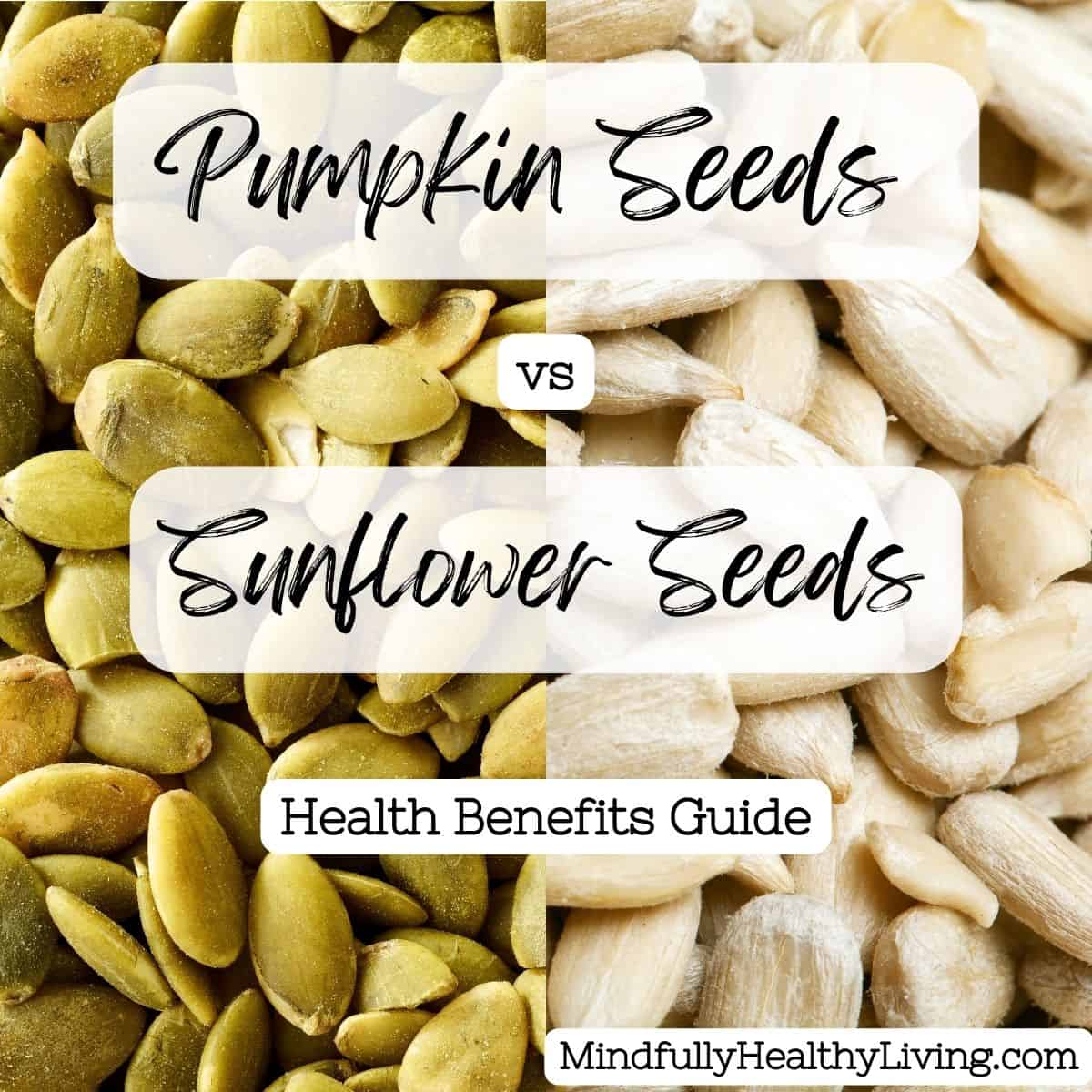
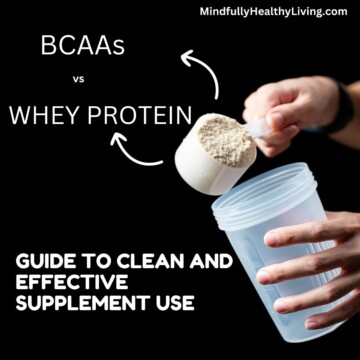
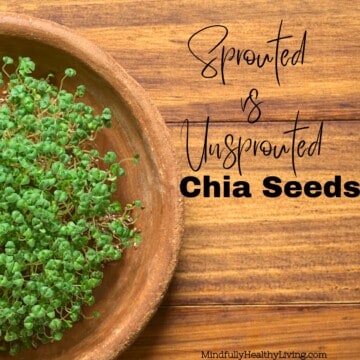
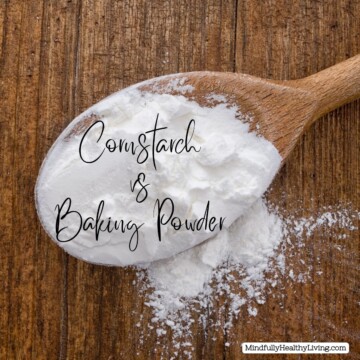
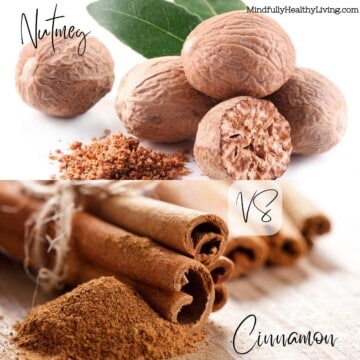
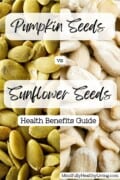
Marian says
wow! This is so comprehensive and helpful. I sent it to my dad too.
Natalie Perry says
Excellent! Thank you for sharing. <3